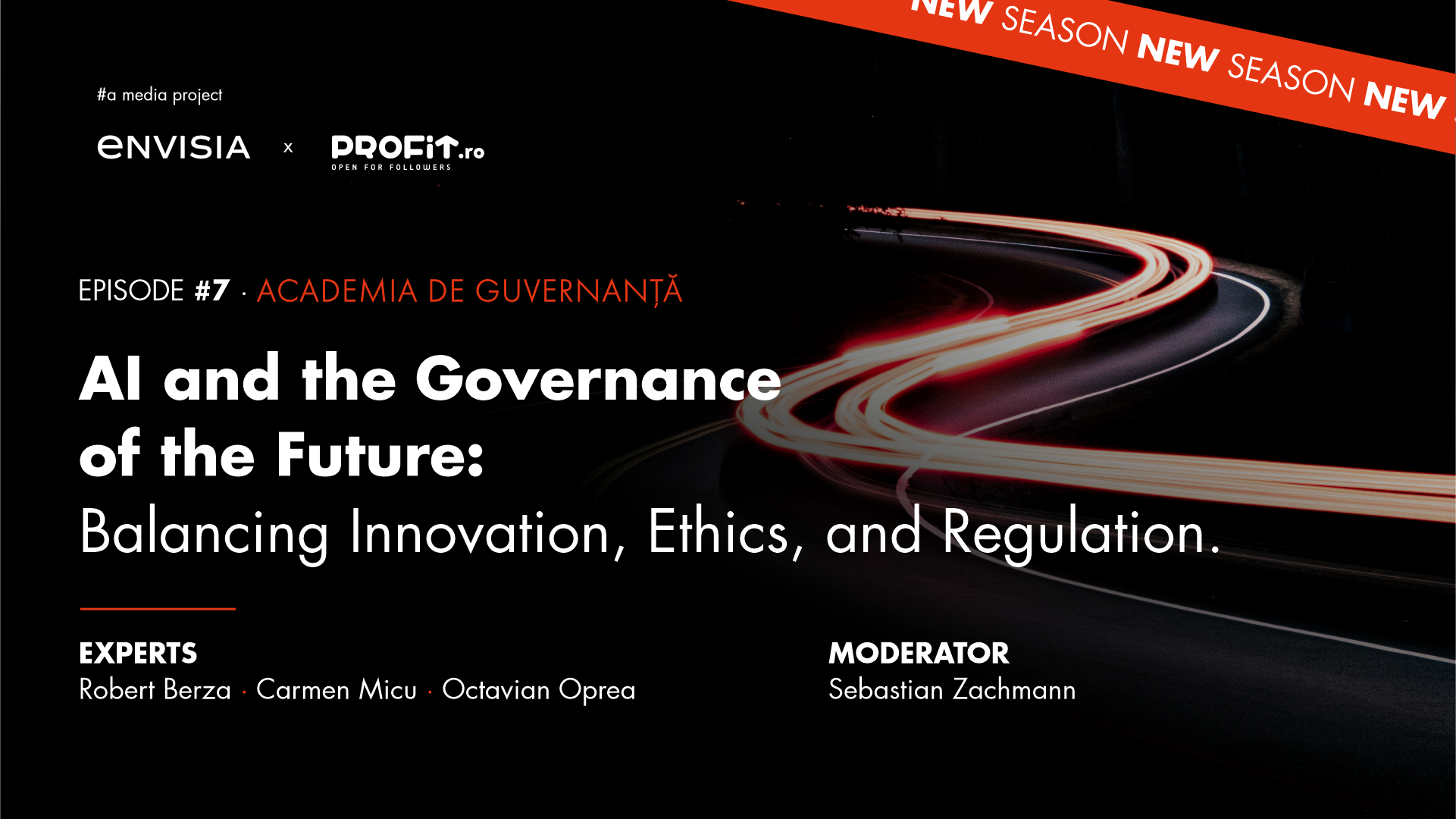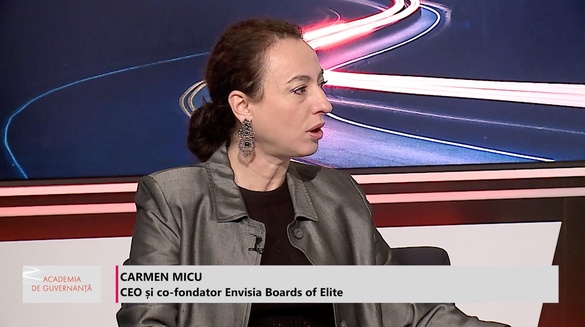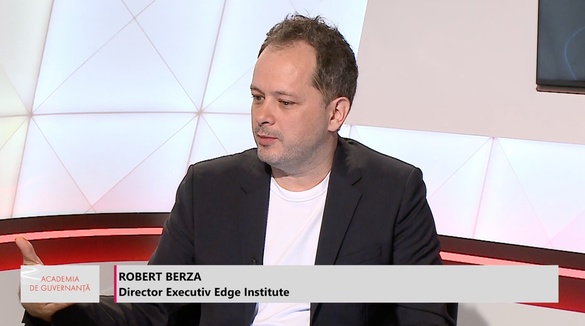AI Governance: The Future of Governance Balancing Ethical AI, Innovation, and Regulation

Romania finds itself at a strategic turning point in adopting artificial intelligence (AI), caught between global pressure, competitive opportunity, and moral responsibility. Without a clear strategy, leadership, and solid AI governance standards, the technology risks becoming either a dangerous accelerator or a missed opportunity, in a context where ethical AI is becoming essential for stability and trust.
This was the theme of the 7th edition of Academia de Guvernanță - The Governance Academy, a media project by Envisia, Profit.ro, and Prima News. During the episode, Carmen Micu, CEO & Co-Founder of Envisia, Robert Berza, Executive Director of Edge Institute, and Octavian Oprea, Member of Parliament and Secretary of the Committee for Technology and Information in the Chamber of Deputies, explained why governance for AI is urgent, how it can become a competitive advantage for the country, and what risks arise if Romania continues to operate without a unified strategy. Moderator: Sebastian Zachmann.
The New Board Mandate: Shifting Responsibilities in the Era of Augmented Decisions
For Carmen Micu, CEO & Co-Founder of Envisia, AI fundamentally changes how boards make decisions—yet the technology must remain “complementary, not a substitute for leadership.”
“From our perspective, the future of governance is augmented by data, not replaced by it. We are not talking about algorithms that decide, but about better-informed human decisions assisted by AI. Such governance requires transparency about how AI contributes to decisions, clear responsibility—who is accountable for an AI-assisted decision—and an auditable process: the ability to explain why an algorithm produced a certain outcome. AI can improve analysis and efficiency, but it cannot replace moral judgment.”

She emphasizes that “governance in the future tense” requires board competencies that combine moral, contextual, and strategic intelligence with AI-generated analysis. It means leaders who collaborate with AI but maintain moral and strategic control—within a paradigm grounded in ethical and responsible artificial intelligence.
The Need for Hybrid Skills: Digital, Ethical, and Strategic Competencies
Carmen Micu argues that leaders are not using AI at the level of complexity required for boards. In her view, most leaders use AI too little, and when they do, they must ensure clear processes and procedures inside the company—especially where AI is involved in risk assessment, fraud detection, or compliance decisions.
“The biggest challenge is the traceability of responsibility,” Micu says.
She explains that data can be manipulated or ideologized, so education in AI governance becomes essential for leaders to identify transparent, clean datasets. Without this competence, AI becomes a major risk in decision-making.
Robert Berza, Executive Director of Edge Institute, highlights the critical role of education in transforming leadership, arguing that Romania has specialists but lacks an integrated strategy.
“There isn’t a strategy, but there are sporadic efforts (…). We have Romanians working at the highest levels in technology and AI. They can contribute to training programs, governance, leadership, or the drafting of a strategy.”
Regulation as a Strategic Lever: The Debate on AI and Innovation
For Robert Berza, the biggest risks in adopting AI are at opposite extremes: either Romania rushes to implement the technology without a strategy, or it remains paralyzed. In his view, these extremes stem from the absence of a coherent AI regulation framework and a clear national strategy for digital public policy.
“The first risk is rushing (…). The second is doing nothing. We are at the extremes, and again it comes down to the need for leadership on this topic (…). Europe is not a strong voice in this global AI race,” he emphasizes.

He explains that the U.S. and China have already developed two opposing models of regulating artificial intelligence: the U.S. through a protected model, and China through open-source frameworks. While these powers compete for supremacy, Europe is losing ground due to its lack of a unified strategy.
Octavian Oprea, Member of Parliament and Secretary of the Committee for Technology and Information, warns that Romania cannot protect its citizens from AI-related risks unless it tests and understands the technology. At present, AI-related legislative proposals are improvised and have little real impact on public administration.
“Legislation has been drafted in a firefighting manner (…). The Romanian state has not had the capacity to stop the negative use of artificial intelligence. Things have changed slightly today, but we need leadership and AI adoption in decision-making processes,” he says.
Public Governance: The Role of Romania (OECD) and the Chief AI Governance Officer
Oprea argues that the critical difference lies not in the technology itself but in the quality of the data powering it. Romania can turn AI into a competitive advantage only by fixing the fundamental issue of data accuracy in the public sector.
He notes that the Romanian administration still makes decisions based on perceptions, not valid data—an issue that limits the country’s ability to adopt digitalization and public sector AI at scale.
.jpg)
“Artificial intelligence could become a real competitive advantage for the Romanian state if it is used based on highly accurate data. We are used to decisions being made less on data and more on perceptions (…). We approved a draft law on organizing and operating the national catalogue of public services (…). The Government has 10 months to operationalize this platform.”
The platform is intended to standardize public services, increase transparency regarding processing times nationwide, and allow direct sanctions for institutional management that fails to comply with standards.
Robert Berza adds that Romania cannot build a meaningful EU AI Regulation strategy without formal leadership—a “command center”. He anticipates the emergence of executive roles such as a Chief AI Governance Officer in public institutions or corporations.
“AI needs serious governance, organization, and structure (…). If you want to adopt a technology of the future, you need leadership of that nature.”
According to the Edge Institute report, Romania needs a governmental CEO for digitalization under an apolitical Deputy Prime Minister as a single point of responsibility. Only then can the country coordinate digitalization projects, develop a strong data layer, and systematically integrate AI into public services.
At the same time, Berza highlights the critical state of digital service adoption: Romania has only 25–28% usage of digital public services, compared to the 75% European average.
Conclusion: Governing Technology Before It Governs Us
Carmen Micu stresses that AI augments all four types of intelligence in the boardroom: logical, emotional, political, and moral.
“All these types of intelligence are strongly augmented by artificial intelligence (…). It has become so advanced that it can emulate emotional states and interpret them. The ability to read context becomes a major competitive advantage in the board,” she says.
She warns that future leaders must know how to manage not only data and context but also the morality of the final decision—a criterion that becomes central as AI enters governance mechanisms.
Carmen Micu summarizes the solution in three pillars: responsibility, transparency, and collaboration across ecosystems. Algorithmic transparency can reduce corruption and increase citizens’ trust in the state. AI thus becomes an instrument of participatory governance, not merely a profit accelerator.
Five Key Takeaways
- Romania urgently needs national AI leadership and a central command structure.
- The quality of public-sector data is essential to turning AI into a competitive advantage.
- AI can increase administrative efficiency only through standardization, transparency, and responsibility.
- Current leaders are not yet sufficiently prepared—structured education and real simulations are necessary.
- Europe risks losing ground to the U.S. and China without a unified strategy, rapid prototyping, and a shared strategic model.
Academia de Guvernanță – Dialogue for a Better Romania
A media project by Prima News, Profit.ro, and Envisia — Romania’s first business school dedicated to governance and the professionalization of board members. Every Friday at 8:00 PM on Prima News. Replays on Tuesday at 10:00 PM. Online at Profit.ro.
About Envisia
Envisia is Romania’s first business school dedicated to corporate governance and the professional development of board members. Through internationally accredited programs, masterclasses, and media initiatives like Academia de Guvernanță, Envisia helps shape leaders who turn good governance principles into performance and trust. Learn more at www.envisia.eu
Recommended articles
Digital Transformation & AI Governance
Leadership, Boardroom Dynamics & Crisis Response
Leadership, Boardroom Dynamics & Crisis Response
Governance & Board Effectiveness
Future of Boards & NED Careers
Future of Boards & NED Careers
ESG & Risk Oversight
Leadership, Boardroom Dynamics & Crisis Response
Governance & Board Effectiveness
Governance & Board Effectiveness
Leadership, Boardroom Dynamics & Crisis Response
Future of Boards & NED Careers
Governance & Board Effectiveness
Governance & Board Effectiveness
Governance & Board Effectiveness
Governance & Board Effectiveness
Future of Boards & NED Careers
Leadership, Boardroom Dynamics & Crisis Response
Future of Boards & NED Careers
 BACK TO ARTICLES
BACK TO ARTICLES
 Facebook
Facebook Linkedin
Linkedin
